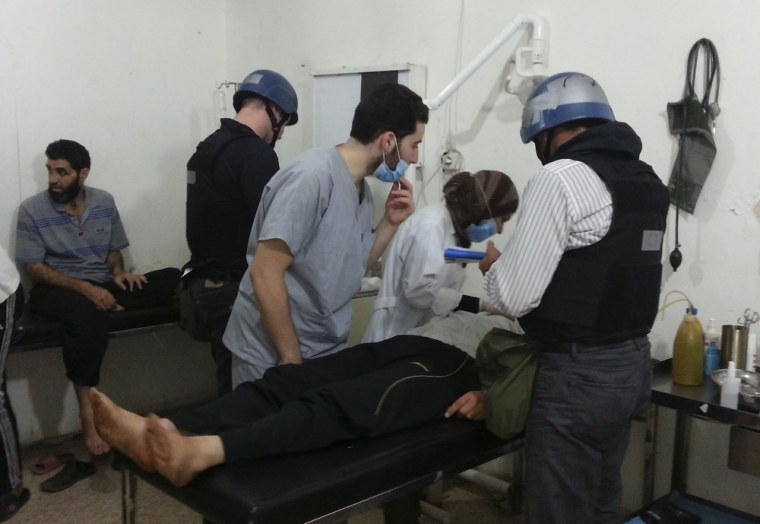Delays in reaching a site where the Syrian government allegedly unleashed chemical weapons against its citizens on Aug. 21 should not prevent chemical weapons investigators from determining whether the outlawed armaments were used, experts tell NBC News.
Despite a five-day delay in reaching the Mouadamiya suburb of Damascus – and encountering sniper fire when they did so on Monday – investigators working under the auspices of the United Nations were able to procure some samples, according to U.N. Secretary-General Ban ki-Moon.
“(The investigators) visited two hospitals, they interviewed witnesses, survivors and doctors, they also collected some samples," he was quoted as telling the French news service AFP. He did not provide details on the type of samples that were recovered.
The ability of the U.N. inspectors to secure samples at the hospitals eases concerns over potential chain-of-custody issues on samples previously gathered by the rebels, both from the living and the dead.
Armando Alcaraz, the principal investigator on chemical weapons at Lawrence Livermore Lab in California, said either blood or environmental samples collected at the site could be valuable in determining whether nerve gas or other toxic agents were used.
"You can see some of adducts (molecules) in the plasma after a couple of months. It is persistent in the blood," said Alcaraz. "Environmental samples last longer depending on the environment. If maintained well, they would be there for a while, in both agents and degradation products that can point to what kind of nerve agents were used.”
Ralf Trapp, the former head of the scientific advisory committee at the Organization for the Prohibition of Chemical Weapons, which is investigating the incident for the U.N., agreed, pointing specifically to blood sampling.
"In blood samples, using sophisticated trace analysis techniques, some specialized laboratories can still identify nerve agent metabolites in blood several weeks after the exposure," said Trapp.
Other toxic chemicals that could have been used would be detectable for even longer periods, Alcatraz said.
Ideally, investigators would like to have biological and environmental samples, but both are not necessary for a determination, Trapp and Alcaraz said.
Obama administration officials have expressed fears that investigators wouldn't be able to make a credible determination whether chemical weapons were used because Syrian forces have repeatedly shelled the areas that were allegedly targeted.
Hundreds of people were reportedly killed before dawn Wednesday in at least four Damascus suburbs in what appears to have been the worst chemical weapons attack since Iraqi leader Saddam Hussein fatally gassed thousands of Kurds in 1988.
The 20-person OPCW team investigating the alleged attack was described by one former OPCW official as "heavy," meaning the inspectors are among the best the international body has available, drawn from a number of member states.
Any samples obtained by the inspectors will be sent back to the OPCW headquarters in The Hague, where officials would then decide which of 21 accredited labs around the world would get the job of making the determination. Two of those labs are in the U.S. -- the Livermore Lab, operated by the Department of Energy, and Edgewood Chemical Biological Center, run by the U.S. Army.
"Samples would be packaged, chain of custody marked and sent to OPCW," said Alcaraz, "They would be married with a control sample. The OPCW would then decide which two labs it would go to. … Both have to agree."
The two selected labs have 15 days to do their test and forward their findings to the OPCW at the Hague.
Related stories
Inside a refugee camp with Syria's 'lost generation'
Kerry accuses Syria of using chemical weapons and destroying evidence
Both experts agreed that the quicker the samples are collected the better. Alcaraz noted as well that the labs are tested annually by the OPCW with samples that are often problematic in terms of low exposure or delayed collection.
"They send samples out once a year to keep the labs skill level high," he said. "We get various samples. We have enough experience to identify agents at low levels."
Alcaraz, asked if Livermore has looked at any samples from Syria in the past, declined comment.
The final report, say OPCW officials, has to be able to withstand scrutiny not just under scientific standards, but legal as well, since it could in theory become evidence in a war crimes trial at the International Criminal Court just across town.
More from NBC News Investigations:
